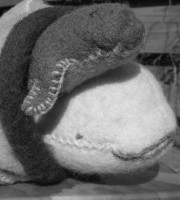For a writer taking criticism of your work is part of the job but it’s difficult not to be devastated by some of the things editors say – or don’t say. When I do critiques for aspiring writers I’m very conscious of this. I try to couch my opinion in a gentle way but that can mean I’m not being honest or clear, so now instead of beating around the bush I preface with some advice on how to approach feedback:
This is probably the first critique of your work you have ever received so you should know that ALL writers (no matter how long they’ve been writing) tend to hone in immediately on the negative remarks in critiques and ignore the positive; I know I do. Having your work critiqued can feel a little like being flattened by a steamroller! Read on, but remember good writing is all about teasing out what’s working and what isn’t, and then rewriting/editing with that in mind. Whether it’s song lyrics, poetry or prose, no one writes perfect ready-to-publish pieces straight from their head onto the page. All ‘mistakes’ are there to be learnt from and are the typical mistakes everyone makes when starting out. If you pick up any of the books on writing I recommend you’ll see they all cover the same ground over and over again. Writing is a craft as well as an art and this critique is about helping you develop the craft. Most writers write, rewrite, rewrite and rewrite again. First drafts are just that – drafts. When I critique work I intend everything to be taken positively. Everything is about going forward to the next stage.
Then comes the critique. At the end I add some advice on how to recover from it:
Picking yourself up after a crit of your work –
Having your work critiqued can be overwhelming and feel very negative. This is how I respond to having my work pulled apart by editors.
- I go into a 24 hour sulk and eat chocolate cake.
- Then I acknowledge to myself that there are things in the crit which hit me in the gut as true. These are things I know in my heart I need to fix.
- Conversely there is usually at least one thing in a crit/edit which I don’t connect with at all, something which feels wrong/incorrect – I examine these but ignore anything which honestly feels wrong or as if the editor didn’t ‘get’ something.
- I may continue to feel irritated and sulky but I accept there is work to be done, usually way more than I thought.
- I take a few days, a few weeks or a few months away from the work to absorb this and to put some distance between myself and the manuscript. When I pick it back up and reread I can usually see lots of stuff that needs doing and can now attack it with energy and purpose.
- Editing and rewriting can feel daunting and a chore but when you actually get into it and see your work get tighter and cleaner and better you should begin to enjoy it.
The yellow image above is one of four pages of feedback from my editor on the first draft of the opening six chapters of my first novel. The blue image is the first page of feedback on draft number four. Note that this sheet only covers the problems on pages 1-37! The scribbles are my reactions to the notes. I was lucky to have a fine editor holding my hand through the process of writing Timecatcher and I learnt a huge amount about the writing craft from him.
To the students of Marino Institute of Education: Three brave Marino students have already sent me work to critique and I enjoyed reading their manuscripts very much. I hope my feedback was useful and they had cake to hand when reading it. I’m up for critiquing three more pieces, so if you are a secret writer or illustrator send me one chapter or some images or a handful of poems or a short story or a picture book idea, but get them to Ciara Ní Bhroin ASAP as it will be on a first come, first served basis.



oh gosh! I have not been doing the chocolate cake part! Seriously, this is good advice about any criticism.
LikeLike
wow, can you help me? I’m the same except I sulk for a week, it is really hard -but somehow I find my stride. Working on a fictional novel I haven’t given it to anyone because of all the previous hurt but I might be ready
LikeLike
It is hard. Even after thirty years I find it hard! I recommend the chocolate cake bit…There are lots of options out there for getting stuff read – some very expensive,some not so. Joining a writers’ group is another option. If you write for children consider joining your local SCBWI-Society of Children’s Book Writers and Illustrators.
https://www.scbwi.org/ I usually only critique picture book texts and illustrations but I’m reading a chapter or a short story for the students at this college because I am their writer-in-res. Best of luck!
LikeLiked by 1 person